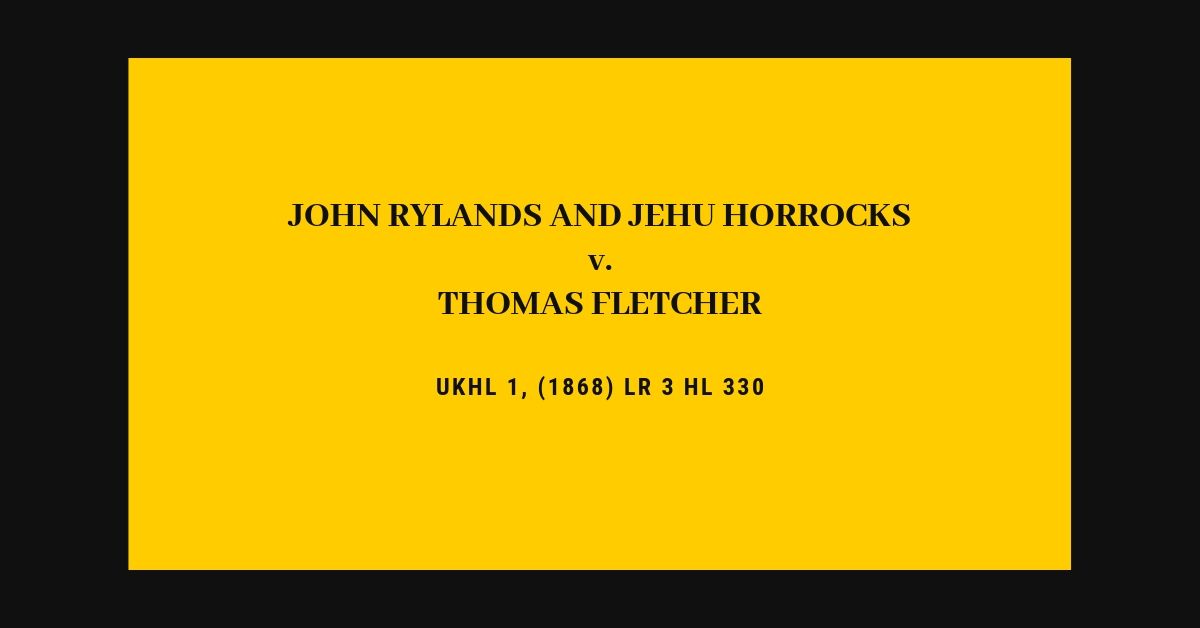|| Areeb Sadaf ||
The rule which was laid down in Ryland v. Fletcher, in 1968 by the House of Lords was of ‘No fault’ liability. The liability was recognised as ‘Strict liability’, i.e, even if the defendant was not negligent or rather, even if the defendant did not intentionally cause any harm, or he was careful, he could be made liable under the rule. However, there are some principles on which basis the case might be determined. Firstly, the defendants were treating them as the owner of the close where the reservoir was constructed and they were free to use it according to their own desires. When there was some accumulation noticed by the plaintiff through the reservoir he might have guarded it by making some sort of barriers to prevent the further leakage of water or thought about some other solutions to it rather than complaining. This could have been a way by which the operation of the laws of nature might have been prevented
To illustrate the aforementioned principle, the case of Smith v. Kenrick in the Court of Common Pleas might be referred to.
Secondly, if the defendants were making any non-natural use of their land for their own purpose which in the natural use of it would not have cause any of those consequences resulting into escape of water into the plaintiff’s land and causing them some damage, which the defendants were doing completely at their own peril would result in the liability of the defendants.
To illustrate the second principle mentioned above it was referred to another case in the same court, Baired v. Williamson
Earlier the court of Exchequer, when the special case stating the facts to which has been referred was argued, was of, the opinion that the plaintiff had established no cause of action. The court of Exchequer chamber, before which an appeal from this judgement was argued, was of contrary opinion and the judges there unanimously arrived at the conclusion that there was a cause of action, and that the plaintiff entitled to damages.
Mr. Justice Blackburn in his judgment, in the Court of Exchequer Chamber, where he states the opinion of that Court as to the law in these words: “We think that the true rule of law is, that the person who, for his own purposes, brings on his land and collects and keeps there anything likely to do mischief if it escapes, must keep it in at his peril; and if he does not do so, is prima facie answerable for all the damage which is the natural consequence of its escape. Therefore, the defendant was held liable.
This rule can also be understood by comparing it with the rule laid down in the case of M.C Mehta v. Union of India which was of ‘absolute liability’ in which the Apex court summed up in the following words:
“We would, therefore, hold that where an enterprise in a hazardous or inherently dangerous activity and harm results to anyone on account of an accident in the operation of hazardous or inherently dangerous activity resulting, for example, in the escape of toxic gas, the enterprise is strictly and strictly liable.”
Exceptions to the rule
There are some exceptions to the rule recognised by Rylands v. Fletcher:
i) Plaintiff’s own default
If the plaintiff suffers damage by his own intrusion into the defendant’s property, he cannot complain about the damages so caused.
ii) Act of God
Act of god or vis major under the rule was considered as a defence by J. Blackburn,6 and defined as “Circumstances which no human foresight can provide against, and of which human prudence is not bound to recognise the possibility.”
iii) Consent of the plaintiff
If the plaintiff has consented to the accumulation of the dangerous thing on defendant’s land, then the liability under this rule does not arise.
iv) Act of the third party
If the harm to the plaintiff has been caused by any stranger, who does not have any relation with the plaintiff, who is not his servant nor in his control then the defendant would not be held liable under this rule.
v) Statutory authority
If an act is done under statutory authority, then it is a good defence to an action for tort. The authority of a statute cannot be pleaded as a defence if there is negligence on the part of the defendant.

